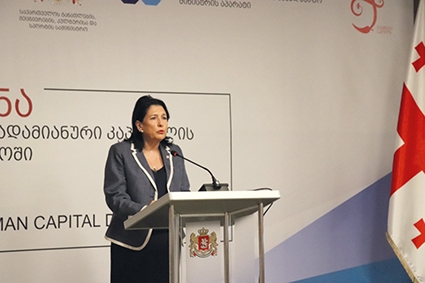State Language as Means of Civic Integration
Last Friday, a conference entitled ‘State Language for Civic Integration and Human Capital Development in Georgia’ took place in Rooms Hotel, Tbilisi. The Georgian President Salomé Zurabishvili opened the conference and emphasized the importance of the Georgian language that unites the state, society and minorities. She explained that language is the basis of identity; it is what reflects the culture of a nation. “The Georgian language and culture have to flourish beyond the borders,” the President said.
The event was organized by the Administration of the President of Georgia, the Ministry of Education, Science, Culture and Sport of Georgia, the Office of the State Minister of Georgia for Reconciliation and Civic Equality and the LEPL Zurab Zhvania School of Public Administration. The discussions gathered representatives of the Georgian government and civil society, who emphasized the importance of the state language for civic integration and the strategies of state institutions for teaching this language to national minorities.
Knowledge of the state language is a real and specific challenge for minorities living in Georgia.
“Georgia has always been a multi-ethnic country," stated Mariam Jashi, Chairperson of the Education, Science and Culture Committee of the Parliament of Georgia. “It is very important for each minority to be able to speak Georgian.”
Ketevan Tsikhelashvili, State Minister of Georgia for Reconciliation and Civic Equality, agreed: “It is only by knowing the state language that each citizen can fully achieve self-realization as a person and a citizen.”
Lia Gigauri, Deputy State Minister of Education, Science, Culture and Sport of Georgia, explained that language is a priority for the government because it is the basis for equality between citizens.
“To provide everyone with equal social and economic opportunities, they first need to learn the state language,” she said. “It is impossible to speak about equality in a country in which not everyone speaks the state language. Knowing Georgian enables people to access higher education and to find jobs. What is important is also to build a country around tolerance and the integration of minorities. In Georgia, there are Azeri and Armenian minorities who have huge abilities and potential and represent a strength for the country. They need to be able to develop these capacities and feel part of Georgia. We must all build our nationhood together.”
In sum, knowing the state language is especially challenging for minorities living in Georgia and efforts have to be made to enable everyone to learn Georgian, so as to be able to access education and jobs. No less important is the need to understand the Georgian culture, be fully part of Georgian society and reach personal stability and self-fulfilment through language.
Another challenge is the protection of the state language in the occupied territories of South Ossetia and Abkhazia. These are regions that are suffering from Russification and which are losing their own language as well as the use of the Georgian language. Most speakers emphasized this issue and the need to concentrate efforts in these regions.
In terms of progress and initiatives supporting the state language, the government representatives presented a number of projects aiming at better access to education. Irine Abuladze, Deputy Minister of Education, Science, Culture and Sport of Georgia, stated that 6% of the GDP should be directed towards education. She explained that some programs exist that provide free language classes to people, as well as programs training language teachers. She said that the language of instruction should be Georgian, particularly from pre-school to upper-secondary school, and that “bilingual programs would be especially welcomed for minorities that want to keep their mother tongue as well as learn Georgian.”
Finally, the richness of the Georgian language was emphasized by Giorgi Alibegashvili, Chairperson of the State Language Department, who reminded those gathered that UNESCO had put the Georgian language and its three scripts on the list of Intangible Cultural Heritage of Humanity.
A Memorandum of Cooperation for implementing joint projects and activities aiming at the delivery of the State language and Literature among ethnic minority representatives was signed at the beginning of the meeting. The signatories were the Office of the State Minister of Georgia for Reconciliation and Civic Equality, the State Language Department, the LEPL Zurab Zhvania School of Public Administration and the National Parliamentary Library of Georgia.
By Gabrielle Colchen
Image Source: religion.geo.gov.ge












